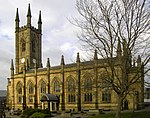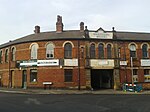Sheffield United F.C.
Sheffield United Football Club is a professional football club in Sheffield, South Yorkshire, England, which competes in the EFL Championship. They are nicknamed "the Blades" due to Sheffield's history of cutlery production. The team have played home games at Bramall Lane since their formation. For most of the club's history, United have played in red and white striped shirts with black shorts. Their main rivals are Sheffield Wednesday, with whom they contest the Steel City derby. The club was formed as an offshoot of Sheffield United Cricket Club in 1889. Following strong performances in the Midland League and Northern League, they were invited to become founder members of the Football League Second Division in 1892. They won promotion to the First Division at the end of the 1892–93 season and went on to be crowned English football champions in 1897–98. United went on to win the FA Cup on four occasions: 1899, 1902, 1915 and 1925; and were beaten finalists in 1901. They spent 41 years in the top-flight before being relegated in 1934. United finished as FA Cup runners-up in 1936 and were promoted as runners-up of the Second Division in 1938–39. United won the Second Division title in 1952–53, following relegation in 1949. They spent the next three decades between the First and Second Divisions, winning promotions in 1960–61 and 1970–71 after relegations in 1956 and 1968. However, a slow decline saw the club drop to the fourth tier by 1982, though they would win an immediate promotion as Fourth Division champions in 1981–82; this achievement meant that Sheffield United are one of only five sides to have won all four professional divisions of English football. Promoted in 1983–84, they recovered from relegation in 1988 to win consecutive promotions into the top-flight at the end of the 1989–90 campaign. Sheffield United were founder member of the Premier League in the 1992–93 season, during which they scored the first ever goal of the competition. They were relegated in 1994 and after losing play-off finals in 1997 and 2003, the club finally regained their Premier League status at the end of the 2005–06 campaign under the stewardship of manager Neil Warnock. However, United were relegated the following year and dropped into League One in 2011. They spent six seasons in the third tier, losing in three play-offs campaigns, before manager Chris Wilder led the club to promotion as champions in 2016–17. Promotion to the Premier League followed in 2018–19, though they were returned to the Championship in 2021.
Excerpt from the Wikipedia article Sheffield United F.C. (License: CC BY-SA 3.0, Authors).Sheffield United F.C.
Bramall Lane, Sheffield Highfield
Geographical coordinates (GPS) Address Nearby Places Show on map
Geographical coordinates (GPS)
| Latitude | Longitude |
|---|---|
| N 53.370277777778 ° | E -1.4708333333333 ° |
Address
Bramall Lane Stadium
Bramall Lane
S2 4SU Sheffield, Highfield
England, United Kingdom
Open on Google Maps





